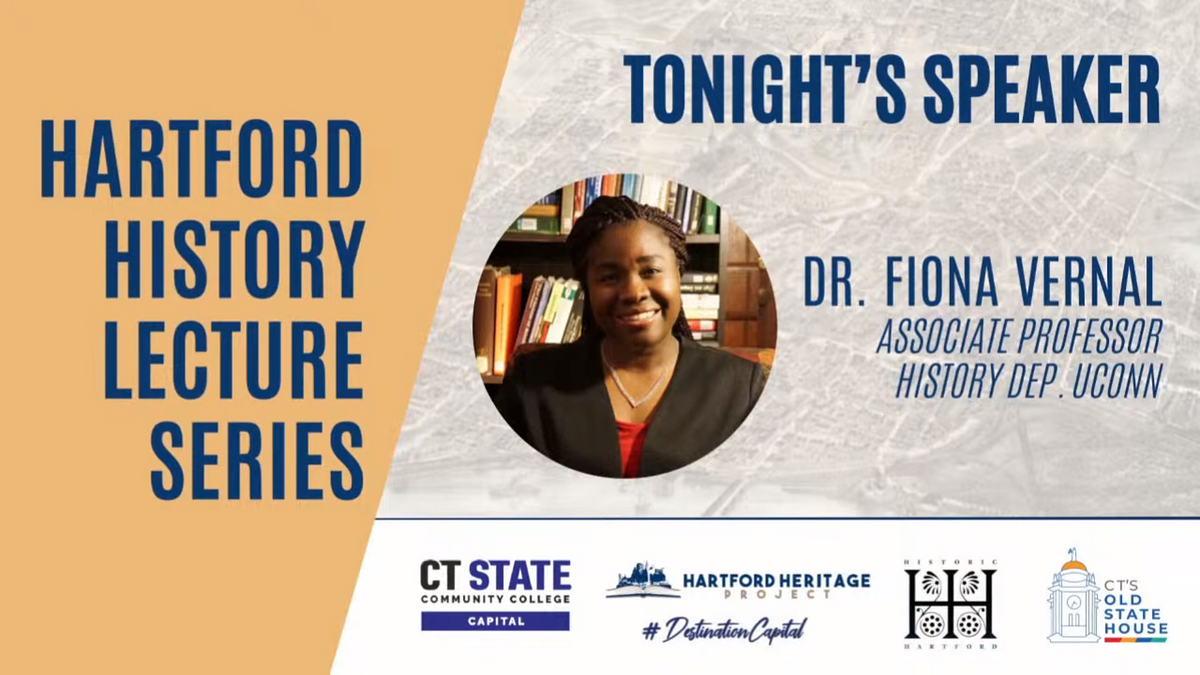Hartford
Black History, Both Lost and Found, at the Old State House
by | Oct 6, 2023 11:51 am
Post a Comment | E-mail the Author
Posted to: Museum

© CT-N, Connecticut Old State House
Why Hartford’s Ethnic Heritage Matters Today
Connecticut’s Old Statehouse
800 Main Street, Hartford
Do you know who Catharine Freebody was?
If you’ve never heard that name, you’re not alone. Ms. Freebody lived and died in Hartford almost 200 years ago, but yesterday she was the focus of Dr. Fiona Vernal’s lecture on Hartford’s ethnic heritage and how it continues to impact the present.
Vernal is a professor of history at the University of Connecticut, where she focuses on African, Caribbean, and African Diaspora histories. She also serves as the director of Engaged, Public, Oral, and Community Histories (EPOCH) and the director of undergraduate studies in the History Department to name only a few of her roles.
Add to that, she is the unofficial biographer of Catharine Freebody. But we’ll get to her soon.

CT-N, Connecticut Old State House
Dr. Fiona Vernal speaks about the ethnic history of Hartford.
Vernal’s presentation centered on a series of articles from 1915 found in the Hartford Courant that discussed the contributions of various ethnic groups to the history and success of Hartford. Across several months, the Courant published several special spreads that celebrated the achievements of Scottish, Swedish, Italian, Jewish and other ethnic groups. On Oct. 24, 1915, the Courant published a spread dedicated to the city’s “colored” residents.

CT-N, Connecticut Old State House
Vernal noted that the description of African Americans’ contributions highlighted them as a “peaceful and orderly” group, instead of trumpeting their achievements as a people. But she also noticed that all of the Black people highlighted in the paper were men. So Vernal set out to find the influential women who certainly lived at the same time — which brings us to Catharine Freebody.
Freebody was born in modern-day East Granby and moved to Hartford. She eventually came to know three of Hartford’s most influential men: Thomas Scott Williams, a former mayor of Hartford and chief justice of the Connecticut Supreme Court, his nephew Judge Francis Parsons, and businessman William H. Imlay. Through her connections, Freebody was able to purchase land that set her up as one of the most generous benefactors for African American churches and causes in the city. When she died in 1845, Catharine Freebody left $1,600 for various causes. That translates into almost $65,000 today, an extraordinary amount of money for a Black woman to have secured for herself at that time.

Dr. Fiona Vernal, University of Connecticut
Hartford's ethnic makeup, 1900.
I was surprised to learn during her presentation that Dr. Vernal’s main area of scholarship is South African history, due to her extensive knowledge of Hartford’s past. When we spoke after her presentation, she told me that there’s a keen interest in how African Americans and West Indians have shaped the city, and that she’s been working with several organizations to unearth those contributions.
“One of the similarities between South African history and Hartford’s history is the absence,” she said. “There are no plaques, curriculum or celebrations of the ways that African Americans have been critical to the history and development of Hartford. Much of this is being revealed for the first time.”
It’s a labor-intensive process. Vernal told me that over 60 hours of research and writing went into her presentation. While she’s happy to do the work, she knows that she can’t do it alone, and is hoping to enlist her students at UConn to carry the torch forward.
“I’m trying to duplicate myself quickly,” she said with a laugh, “because there’s so much work to be done. I want to be able to focus my research on people like Catharine Freebody, Black women who have been ignored by history.”
We need more series like the Hartford History Series to give brilliant scholars a chance to showcase their research. We need more scholars like Vernal who invest their energy and passion into telling untold stories. Most importantly, we need a broader range of people who are willing to put in the work, to find those who have been forgotten so that future generations can remember.

NEXT
You can read more of Dr. Vernal’s research at her website, Hartford Bound. You can also watch her lecture here.
The Hartford History Lecture Series continues on Oct/ 7th with a tour of Trinity College.
Jamil gets ready for election season with a gallery of political cartoons.